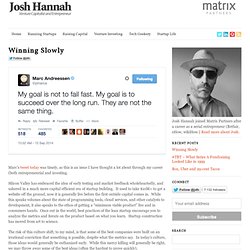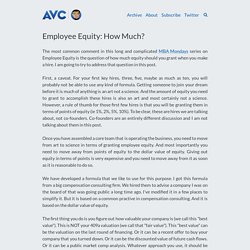

Venture Capital is Terrible, Patience is King, Employee Equity, Properly Cancel Meetings, Understand Bitcoin. Requests for Startups. Introduction.

Here’s How to Cancel a Meeting the Right Way. I wrote a version of this post four years ago but given the hectic nature of today’s tech markets I thought it was worth revisiting and updating.

Canceling meetings is a part of modern day life. I seem to get so over programmed that if I ever want to have a “break-out” unplanned trip somewhere I seem to have to reschedule meetings. Not fun, but a reality. People reschedule meetings with me on a regular basis, too. If done correctly I never have any problem with it at all. When you do need to reschedule a meeting make sure to put yourself in the other person’s shoes. Let me give you an example. The meeting was set for Wednesday, May 8th at 11am.
As the day approached I noticed that there was a conference in LA that I wanted to attend. I wrote directly to his assistant asking why he had cancelled and made it clear that I had not attended a conference in town due to my having accepted this meeting. They were stuck at the same conference that I had wanted to attend. Venture capital is a terrible investment, but it may be good for America. Venture capitalists maintain a heroic self-image even as other elements of the financial services industry have fallen into a degree of discredit.

These guys aren't just shuffling money around — they're providing the financial sinews of innovation! But Diane Mulcahy of Babson College and the Kauffman Foundation says the entire sector is basically a huge scam. She points out that the VC sector underperforms all the broad public stock indexes. You'd be better off investing your money in a nice S&P 500 index fund than with a sexy venture capital outfit. It's less risky, and the returns are higher. VCs make money off fees, not performance But even though VC funds are a bad bet, venture capitalist fund managers end up doing just fine. Winning Slowly. Marc’s tweet today was timely, as this is an issue I have thought a lot about through my career (both entrepreneurial and investing.

Silicon Valley has embraced the idea of early testing and market feedback wholeheartedly, and ushered in a much more capital efficient era of startup building. It used to take $10M+ to get a website off the ground, now it is generally live before the first outside capital comes in. While this speaks volumes about the state of programming tools, cloud services, and other catalysts to development, it also speaks to the ethos of getting a “minimum viable product” live and in consumers hands. Once out in the world, best practices of the lean startup encourage you to analyze the metrics and iterate on the product based on what you learn.
Startup construction has moved from art to science. The risk of this culture shift, to my mind, is that some of the best companies were built on an irrational conviction that something is possible, despite what the metrics say. An Inside Look at Anonymous, the Radical Hacking Collective. In the mid-nineteen-seventies, when Christopher Doyon was a child in rural Maine, he spent hours chatting with strangers on CB radio.

His handle was Big Red, for his hair. Transmitters lined the walls of his bedroom, and he persuaded his father to attach two directional antennas to the roof of their house. CB radio was associated primarily with truck drivers, but Doyon and others used it to form the sort of virtual community that later appeared on the Internet, with self-selected nicknames, inside jokes, and an earnest desire to effect change. 'iPhone set to struggle', says research. Apple's much-anticipated iPhone, which goes on sale in the US today, will struggle to break into the mainstream because of a lack of a 3G connection and low demand for converged devices, according to research.

International research conducted by media agency Universal McCann has concluded that Apple's goal of selling 10m iPhones by the end of 2008 is too ambitious. Apple's iPhone combines a phone, music and video player with web and email capabilities, but researchers found demand for these converged devices was lowest in affluent countries. Only 31% of Americans surveyed said they wanted a device with multiple capabilities, and that dropped to 27% in Japan. Demand was highest in Mexico, where 79% said they would like one converged device, with 72% in Malaysia and Brazil, 70% in India and 65% in the Philippines, although the mobile markets in these countries are driven by very cheap or free handsets. Explain Bitcoin Like I’m Five. The Solution What if we gave this ledger — to everybody?

Instead of the ledger living on a Blizzard computer, it’ll live in everybody’s computers. All the transactions that have ever happened, from all time, in digital apples will be recorded in it. Employee Equity: How Much? The most common comment in this long and complicated MBA Mondays series on Employee Equity is the question of how much equity should you grant when you make a hire.
